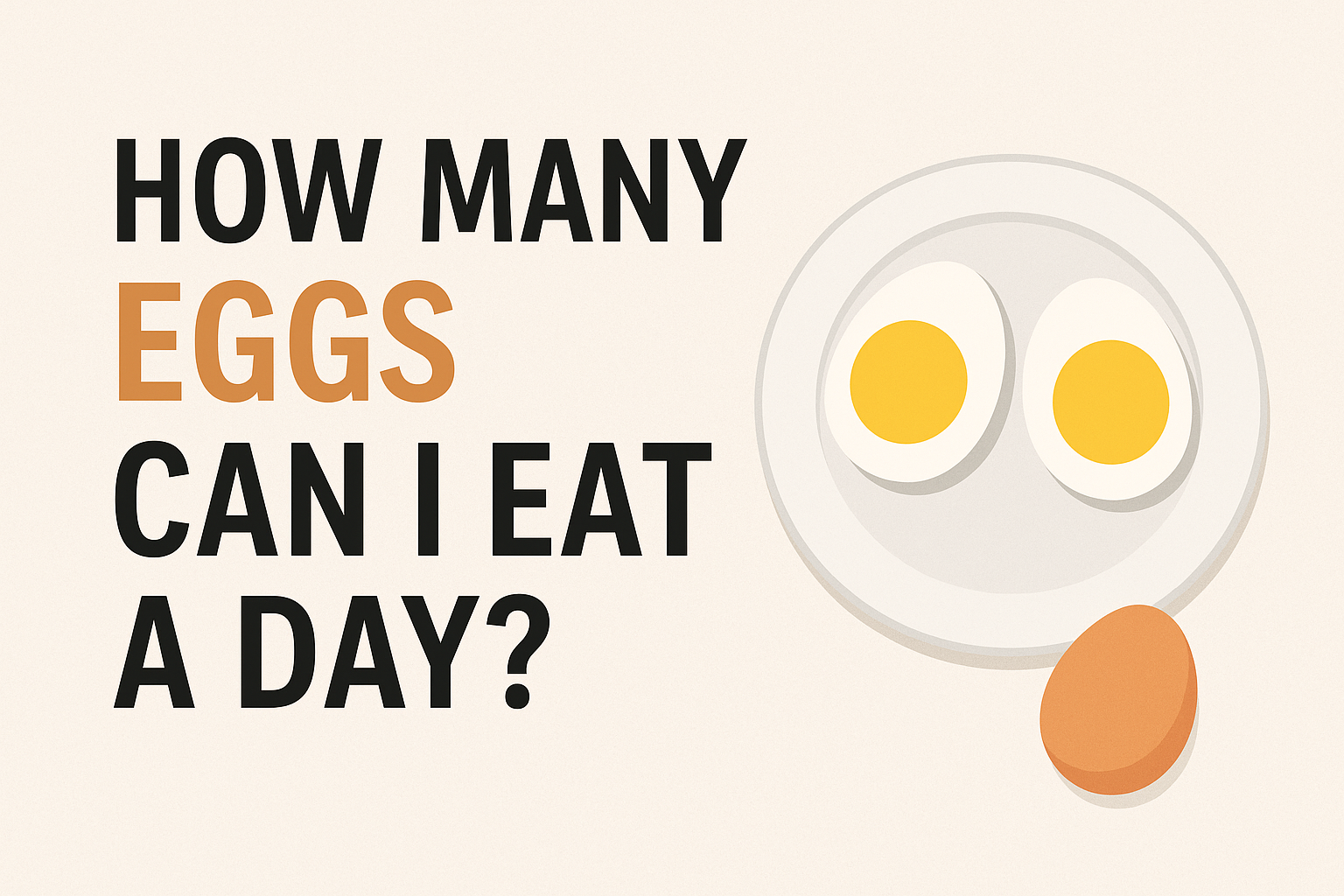Eggs have long been a breakfast staple and a powerhouse of nutrition. But one question continues to spark debate: how many eggs can I eat a day without harming my health?
In recent years, research has shifted from fearing dietary cholesterol to understanding how whole foods affect overall wellness. Let’s explore the science, nutrition facts, and expert recommendations to help you make an informed decision about daily egg consumption.
Why Eggs Are Considered a Superfood
Before discussing how many eggs can I eat a day, it’s important to recognize why eggs are so valued in a balanced diet.
Each egg is packed with:
-
High-quality protein: About 6–7 grams per egg
-
Essential vitamins: A, D, E, B12, and folate
-
Minerals: Iron, selenium, and zinc
-
Healthy fats: Including omega-3s (especially in enriched eggs)
These nutrients support muscle growth, brain function, and eye health. The combination of protein and fat also helps you stay full longer, making eggs a smart option for weight control.
The Cholesterol Question
For decades, people were warned to limit eggs because of their cholesterol content. One large egg contains about 186 mg of cholesterol, all in the yolk.
However, newer studies show that dietary cholesterol from eggs doesn’t have the same effect on blood cholesterol for most people. The body adjusts by producing less cholesterol internally when more is consumed through food.
Health organizations now emphasize overall diet quality rather than single foods. That means how many eggs can I eat a day depends more on your total lifestyle and health profile than on one number.
What the Research Says
Recent research supports that moderate egg consumption is safe for most healthy individuals.
-
A 2018 study in the American Journal of Clinical Nutrition found that eating up to 12 eggs per week had no negative impact on heart health in people with or without diabetes.
-
Another study from Harvard University concluded that one egg per day is safe for the general population and may even reduce the risk of stroke.
So when asking how many eggs can I eat a day, most experts agree that one to two eggs daily is perfectly fine for healthy adults as long as the rest of your diet is balanced.
Factors That Influence How Many Eggs You Can Eat
Not everyone has the same nutritional needs or risk factors. Here’s what to consider when deciding how many eggs can I eat a day:
-
Overall diet quality – If your diet is already high in saturated fat or processed food, adding too many eggs might increase cholesterol levels.
-
Physical activity – Active people and athletes can safely consume more eggs for protein and recovery.
-
Health conditions – Individuals with diabetes or heart disease should consult a doctor before increasing egg intake.
-
Preparation method – Boiled or poached eggs are healthier than fried eggs cooked in butter or oil.
The Best Ways to Eat Eggs Daily
If you plan to include eggs regularly, variety and balance are key. Here are a few healthy ways to enjoy them while keeping how many eggs can I eat a day within safe limits:
-
Boiled or poached: Retains nutrients without extra fat.
-
Scrambled with vegetables: Adds fiber and antioxidants.
-
In salads or grain bowls: Enhances protein and flavor.
-
Omelets with greens: Ideal for a complete meal.
Avoid pairing eggs with processed meats like bacon or sausages too often, as those can raise your overall saturated fat and sodium intake.
Eggs and Weight Management
Eggs can be an excellent part of a weight-loss or maintenance plan. Their high protein content promotes satiety, helping you eat fewer calories throughout the day.
A breakfast that includes eggs can improve focus and reduce mid-morning hunger. So, for those asking how many eggs can I eat a day when trying to lose weight, one to two eggs with whole-grain toast or vegetables is a great balance.
Common Myths About Eating Eggs
Let’s clear up a few misconceptions around how many eggs can I eat a day:
-
Myth 1: Eating eggs daily raises cholesterol dangerously.
Fact: For most people, eggs have little impact on long-term cholesterol levels. -
Myth 2: Only egg whites are healthy.
Fact: The yolk contains essential nutrients like vitamin D and choline. -
Myth 3: You should limit eggs after age 40.
Fact: Healthy adults can eat eggs at any age as part of a balanced diet.
Frequently Asked Questions (FAQs)
1. Is it okay to eat eggs every day?
Yes, most healthy adults can eat one to two eggs daily as part of a balanced diet.
2. Can eating too many eggs cause heart problems?
For most people, moderate egg consumption is safe. Those with heart disease should follow their doctor’s advice.
3. Should I eat the yolk or just the white?
Both have benefits the white provides protein, while the yolk contains vitamins and healthy fats.
4. Are eggs good for weight loss?
Yes. Eggs help you feel full and provide nutrients that support energy and muscle health.
5. How many eggs can children eat daily?
One egg per day is typically safe for children, depending on their age and nutritional needs.
Final Thoughts
So, how many eggs can I eat a day safely? For most people, one to two eggs daily fits perfectly into a healthy diet. They offer high-quality protein, essential vitamins, and healthy fats all at an affordable cost.
As with any food, balance is key. Combine eggs with vegetables, fruits, whole grains, and lean proteins for the best health results.
If you have specific health conditions, consult your doctor or a registered dietitian for personalized guidance. But for the average person, enjoying eggs every day is not only safe it’s one of the smartest nutrition choices you can make.





